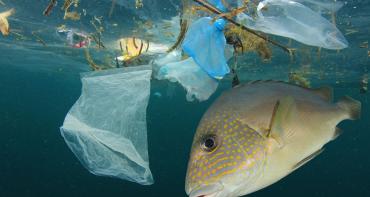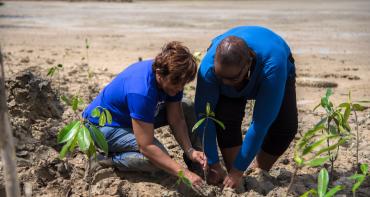In March this year state-of-the-art submarines will descend to previously unexplored depths of the Indian Ocean on a pioneering research expedition.

In March this year state-of-the-art submarines will descend to previously unexplored depths of the Indian Ocean on a pioneering research expedition.
First Descent, a collaboration of ocean research institute Nekton, the Commonwealth and 46 other partners, launched the multidisciplinary exploration at the Commonwealth headquarters in London.
The expedition ship, a floating research station, is travelling to Seychelles equipped with cutting-edge subsea technologies, including a submersible capable of descending as deep as 3,000 metres into the ocean, and some of the worldŌĆÖs top scientists on board to test the health of the ocean.
Speaking to Commonwealth high commissioners, media, scientists and ocean specialists at the launch, Secretary-General Patricia Scotland said that extending the frontiers of deep sea exploration will help governments to make more informed decisions about policies to address climate change challenges and govern ocean-based sectors such as fishing and tourism.
The Secretary-General issued a stark warning about the urgency of addressing the global challenge of climate change.
She said, "We face an existential threat as a result of the changes in climate. Unless we map and understand better what is in our oceans, we are doomed to repeat some of the mistakes we made on land.
ŌĆ£Our partnership with Nekton is important because it will assist Commonwealth co-operation and accelerate action by the governments of our member countries to protect the ocean. The data gathered from this exploration enable us to test the oceanŌĆÖs health, and will guide governments and policy-makers in making informed and effective decisions on ocean governance issues relating to climate change, overfishing and conservation.ŌĆØ
In November the Commonwealth and Nekton signed a memorandum of understanding to boost actions under the Commonwealth Blue Charter ŌĆō a joint commitment by member countries to protect the ocean and sustainably manage its resources.
CEO of Nekton Foundation, Oliver Steeds, said the ocean research expeditions will be guided by Commonwealth values.
ŌĆ£First Descent is aligned to the principles of the Commonwealth Blue Charter, an agreement by all 53 Commonwealth countries to actively co-operate to solve ocean related problems and meet commitments for sustainable ocean development,ŌĆØ said Mr Steeds.
ŌĆ£Humankind is poised to make the next giant leap into the deep ocean. We need to discover what is there before the oceanŌĆÖs demise triggers our own. In many ways I think that is why the Commonwealth with Nekton and our partners is launching First Descent today.ŌĆØ
Scientists at the event joined the calls for urgent action.
Oxford Professor Alex Rogers, who is part of the First Descent research team, spoke about the importance of examining the zone between 30 and 3,000 meters in the ocean, where, he explained, there is a peak diversity of species.
ŌĆ£We are in a situation where the ocean is suffering from serious degradation through the damaging effects of overfishing, pollution, and we are all aware of the growing story of marine plastics and the effect of climate change - and that includes ocean warming, ocean acidification and deoxygenation of the ocean. So itŌĆÖs really critically important that we understand how life is distributed through the ocean now so that we can make decisions that are actually better informed.ŌĆØ
First Descent will kick-off in Seychelles, where Nekton is working on behalf of the Seychelles government and partners. The country has committed to protect 30% of their ocean territory by 2020 and champions the ŌĆśAction GroupŌĆÖ for marine protection under the Commonwealth Blue Charter.
Seychelles High Commissioner, Derick Ally, said, ŌĆ£We also are a leader in the blue economy concept, and with the help of the Commonwealth, which has developed a blue economy roadmap for us, we are taking steps now to make better use of our ocean resources.ŌĆØ
Secretary-General Scotland added that the data gathered from the missions will have applications for the CommonwealthŌĆÖs 53 countries and will inform progress and development of the Blue Charter and other initiatives.
She said, ŌĆ£We are collating this information to help us better understand what good ocean governance would look like, and then we are creating a series of implementation toolkits; because many countries are saying, we want to do something, but what do we do and how do we do it? We will now be in a better position to give them a blueprint to follow.ŌĆØ
.


